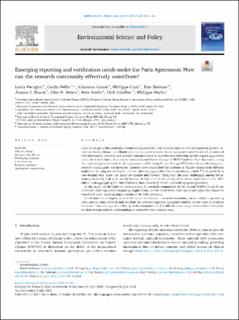Emerging reporting and verification needs under the Paris Agreement: How can the research community effectively contribute?
Perugini, Lucia; Pellis, Guido; Grassi, Giacomo; Ciais, Philippe; Dolman, Han; House, Jo; Peters, Glen Philip; Smith, Pete; Günther, Dirk; Peylin, Philippe
Journal article, Peer reviewed
Published version

View/
Date
2021Metadata
Show full item recordCollections
- Journal articles [478]
Abstract
Greenhouse gas (GHG) emission inventories represent the link between national and international political actions on climate change, and climate and environmental sciences. Inventory agencies need to include, in national GHG inventories, emission and removal estimates based on scientific data following specific reporting guidance under the United Nation Framework Convention on Climate Change (UNFCCC) and the Paris Agreement, using the methodologies defined in the Intergovernmental Panel on Climate Change (IPCC) Guidelines. Often however, research communities and inventory agencies have approached the problem of climate change from different angles and by using terminologies, metrics, rules and approaches that do not always match. This is particularly true dealing with “Land Use, Land-Use Change and Forestry” (LULUCF), the most challenging among the inventory sectors to deal with, mainly because of high level of complexity of its carbon dynamics and the difficulties in disaggregating the fluxes between those caused by natural and anthropogenic processes. In this paper, we facilitate the understanding by research communities of the current (UNFCCC) and future (under the Paris Agreement) reporting requirements, and we identify the main issues and topics that should be considered when targeting improvement of the GHG inventory. In relation to these topics, we describe where and how the research community can contribute to producing useful inputs, data, methods and solutions for inventory agencies and policy makers, on the basis of available literature. However, a greater effort by both communities is desirable for closer cooperation and collaboration, for data sharing and the understanding of respective and common aims.
